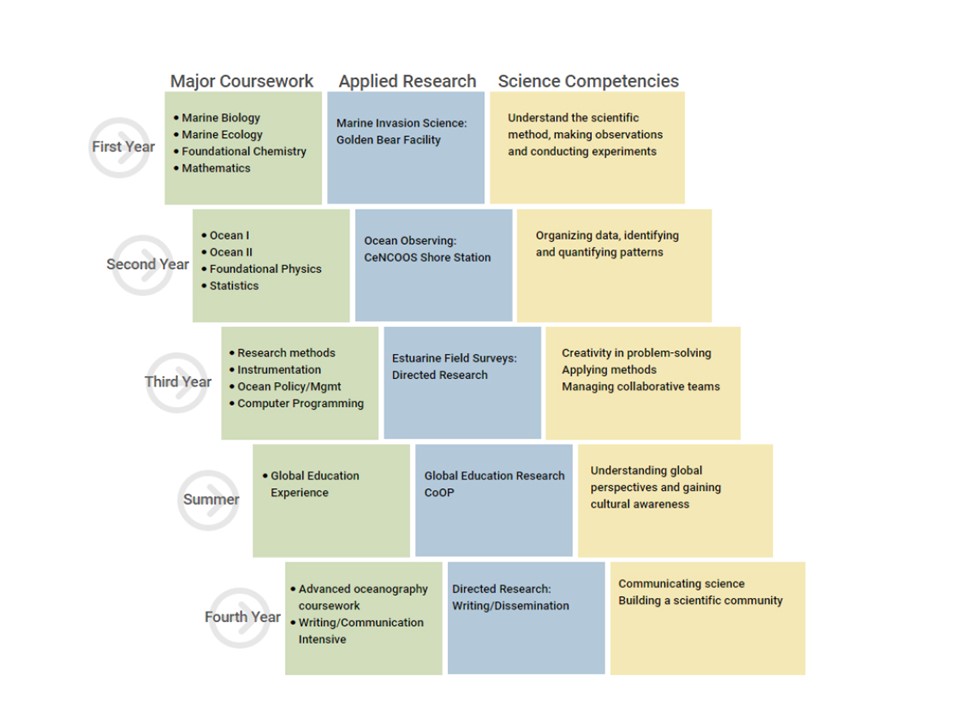Oceanography Curriculum Map
Oceanography Program Curriculum Map
The Bachelor of Science in Oceanography includes foundational science courses in chemistry and physics, calculus and statistics. Lower division oceanography courses include geological, chemical, physical, and biological oceanography. Upper division courses include environmental policy, computer programming, instrumentation, advanced writing, and specialized oceanography courses. Every oceanography student completes a directed research project or a Co-Op experience working in the field of ocean science.
The Oceanography Major roadmap provides a detailed view of the BS Oceanography courses in their preferred sequence.

Current Course Offerings:
OCN 100 Marine Biology
Class Hours: 3 Units: 3
Introduction to organismal biology using marine examples. Origin and diversity of
marine life include prokaryotes, protists, marine invertebrates and vertebrates.
Mendelian genetics, speciation, reproduction., basic cellular physiology
OCN 100L Marine Biology Laboratory
Class Hours: 1 Units: 1
Introduction to stereo and compound microscopes, plankton collections and enumeration
of phytoplankton and zooplankton, fouling invertebrates and marine invasive species,
invertebrate and vertebrate dissections.
OCN 110 Marine Ecology
Class Hours: 1 Units: 1
Introduction to marine ecology of diverse habitats including the estuarine, intertidal,
epipelagic, and deep sea, coral reefs and polar ecosystems.
OCN 110L Marine Ecology Laboratory
Class Hours: 1 Units: 1
Laboratory/field-based course working in local marine environments, including estuarine,
wetland, rocky intertidal, and beach communities, to understand marine ecology. This
service-learning course will partner with state, federal, or nongovernmental agencies
to collect and interpret ecological data. Several field trips are planned during
the semester.
OCN 200 Oceanography I: Geology and Chemistry
Class Hours: 1 Units: 1
History of oceanography, seafloor features, plate tectonics, marine sediments, chemistry
of seawater, dissolved gases and ocean resources.
OCN 200L Oceanography Lab
Class Hours: 1 Units: 1
Quantitative problem-solving in oceanography, application of open source oceanographic
data. Sampling the San Francisco Estuary.
OCN 210 Oceanography II: Physics and Biology
Class Hours: 1 Units: 1
Introduction to atmosphere-earth-ocean interactions, global climate processes, ocean
circulation, waves, tidal processes, plankton, nekton, and benthic organisms.
OCN 305 Introduction to Ocean Science Research
Class Hours: 1 Units: 1
Critical study, analysis and evaluation of primary scientific literature. Oral and
written presentations of recent scientific papers. Semester projects include an annotated
bibliography using an electronic reference management system and an oceanography research
proposal.
OCN 310 Oceanographic Instruments and Analysis
Class Hours: 2 Units: 2
Classroom discussion of oceanographic sampling techniques, modern instrumentation
and laboratory analyses. Techniques for measuring ocean temperature, salinity, dissolved
oxygen, phosphate chlorophyll-a, pH and total dissolved carbon dioxide, and photosynthetically
available radiation.
OCN 310L Oceanographic Instruments and Analysis Laboratory
Class Hours: 3 Units: 1
Hands-on laboratory. Ocean sampling techniques, practical training in modern instrumentation
and laboratory analyses. Techniques for measuring ocean temperature, salinity, dissolved
oxygen, phosphate chlorophyll-a, pH and total dissolved carbon dioxide, and photosynthetically
available radiation.
OCN 320 Oceans and Climate
Class Hours: 3 Units: 3
A physics-based description of the atmosphere-ocean global (large scale) circulation
and its driving forces. Exploration of the Earth-system’s climate and the potential
implications of climate change.
OCN 330 Marine Microbial Ecology
Class Hours: 3 Units: 3
Ecology of microbes in the ocean, including diversity, biomass, and metabolic activity.
Role in oceanographic process and marine biogeochemical cycles. Prokaryotes (archaea
and bacteria), autotrophic, heterotrophic and mixotrophic protists described and interactions
with non-microbial organisms.
OCN 340 Chemical Oceanography
Class Hours: 3 Units: 3
Chemical description of the ocean, past and present. Elemental cycling, the effects
of biological, chemical, geological and physical processes on the chemistry of seawater,
and the distribution of gases, ions, nutrients and trace metals.
OCN 350 Physical Oceanography
Class Hours: 3 Units: 3
Conservation of momentum and vorticity with particular attention to the boundary layer
dynamics of ocean circulation. Introduction to wave-driven boundary layer dynamics
and its effects on mixing.
OCN 380 Directed Research / Co-Op Experience
Class Hours: 1 Units: 1
Collaborative research / work experience in the field of marine science, oceanography,
marine / estuarine natural resource management. Demonstrate competence in hypothesis-testing,
gathering and analyzing data. Placement in Co-Op experiences must be approved by
the major advisor.
OCN 380L Directed Research / Co-Op Experience Laboratory
Class Hours: 6 Units: 2
Collaborative research / work experience in the field of marine science, oceanography,
marine / estuarine natural resource management. Demonstrate competence in hypothesis-testing,
gathering and analyzing data. Placement in Co-Op experiences must be approved by
the major advisor.
OCN 410 Phycology
Class Hours: 3 Units: 3
Taxonomy, phylogeny, morphology, physiology and ecology of marine and freshwater algae.
OCN 420 Marine Biological Invasions
Class Hours: 3 Units: 3
The biology, evolution and ecological impacts of aquatic introduced species on the
marine environment. Emphasis on marine invertebrates. Discussion of strategies for
prevention, detection, and management of impacts to human systems as well as the role
of climate change on biotic homogenization of marine systems.
OCN 440 Introduction to Ocean Remote Sensing
Class Hours: 3 Units: 3
General theory underlying ocean remote sensing. Application of techniques. Methods
for accessing, manipulating, combining and interpreting remotely-sensed data.
For more information, contact Dr. Alex Parker